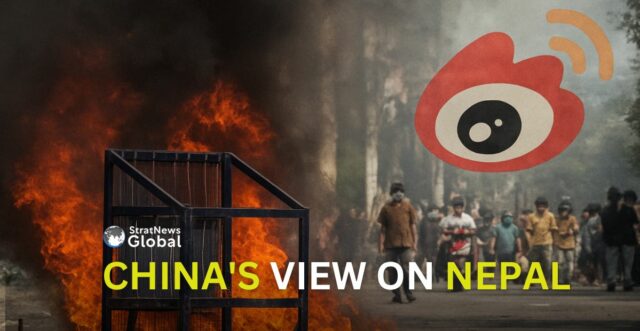Alongside the chatter of Apple’s new iphone 17 Air release, Chinese microblogging site Weibo is abuzz with the hashtags of Nepal. As Nepal grapples with violent ‘Gen-Z’ protests and resignation of PM K.P.Oli, Chinese netizens reacted with a mix of anxiety, suspicion and advice.
Chinese netizens looked at the unrest in a wider regional context. “Is (the riot in) Indonesia over yet? Why is Nepal in a mess now?” one user asked, linking Kathmandu’s unrest to recent youth-led protests in Southeast Asia. Another wrote: “Indonesia, Serbia, Nepal… who is next? This Mid-Autumn [Festival] has become a test of political stability.”
The discussions were dominated by the suspicion of foreign interference. Several users accused US of playing a greater role in the protest, “America’s dirty tricks,” one wrote, while another said, “the possibility of America being behind it is big.” Others linked India to the unrest: “It’s not just India, America too is definitely a part of it.”
Some netizens drew parallels with Middle Eastern turmoil: “Another Syria in the making—first comes euphoria followed by the realization of total disaster.”
Another user recalled the $500 million U.S. Millennium Challenge Corporation grant signed with Nepal, alleging it forced Kathmandu to subordinate its domestic laws and open the door to NGOs.
Amid all this, some users urged proactive Chinese engagement. “Why don’t we help our ally?” one user asked. Another suggested that China could leverage platforms such as the China-Nepal Cooperation Forum to help Nepal build “versions of the CPPCC or NPC”.
One user even went on to predict that instability would spread: “It’s just a matter of time the fire will spread to Bhutan.”
The resignation of Prime Minister Oli triggered mixed responses. Some hailed it as a “victory of Nepalese people” while others urged harsher measures: “Learn from Indonesia, arrest a few and the rest will behave.”
Chinese netizens’ reactions highlight how Nepal’s unrest is viewed in China less as a local democratic reckoning and more as a reflection of broader global power struggles.





